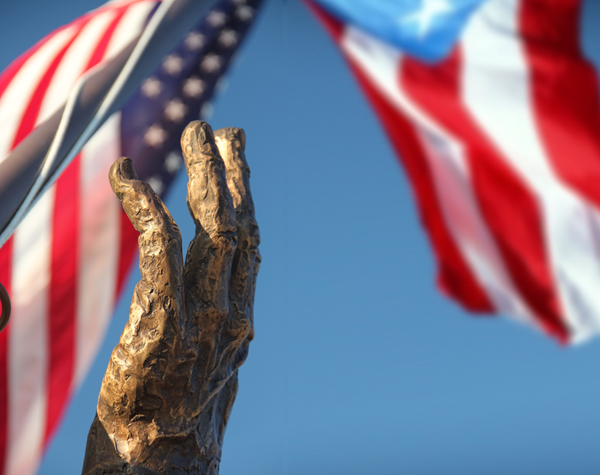By now, you have probably heard or seen the things happening in the U.S. around the topic of immigration--more specifically, around Hispanic/Latino immigration. This is a complex issue that I myself do not fully understand. I am not an immigrant. My family are not immigrants. In fact, everyone in my family has been born a U.S. citizen for over 100 years. So there is a lot about this issue that I don’t understand because I have never had to deal with it. However, living in the South my whole life, particularly as of late, many of the things that affect immigrants and undocumented immigrants have been affecting me, simply because I have brown skin, dark hair, brown eyes and speak Spanish.
I look Hispanic and I speak Spanish because my family is from Puerto Rico. Although I was born in a military base in St. Bernard Parish, Louisiana, I consider myself Puerto Rican. My roots are Puerto Rican and I am proud of that heritage. As I mentioned, my family have all been citizens for 102 years. In 1917, Puerto Rico became a U.S. territory (or colony) under the Jones Act, which granted the island citizenship. Legally speaking, moving from Puerto Rico to the mainland is not immigration; it is the same thing as moving from one state to another. Immigration issues and legal documentation are things I just have never had to even think about. Even while living in the South my whole life, the extent of the prejudice and racism I experienced was the “normal” stuff. I heard things like “Speak English, this is ’Merica” and “Puerto Rico is part of the U.S.?” As embarrassing as it is to admit, I thought well into my teens that a green card was an American Express. It wasn’t until 2016 that my very last shred of ignorance on the matter of immigration disappeared.
What happened in 2016? Donald Trump was elected president of the United States of America. The morning after election night, I went out to the airport for an early flight. I travel frequently, and my fairly small home airport was predictably desolate at 4am. As I made my way to TSA, I was happy to see that I was the only one there and I would get through security quickly. When I came up to the agent, an older white gentleman, I handed over my license and boarding pass. He looked me up and down, and without looking at any of it he looked at me and said, “You have been randomly selected for a drug screening.” I gave him a “seriously” look and put my hands out, palms up. He passed the machine over my hands and the results were negative.
When he finally looked at my boarding pass and ID, he kept looking at my license over and over, like he was making sure it was real. Then he kept looking at my picture then back up at me, trying to confirm it was the same person. Throughout the 15 minutes of screening, I kept thinking, “things are not going to be the same anymore because I don’t look like I am a U.S.-born citizen.”
Over the last three or so years, I have had these types of experiences more frequently. As anti-immigrant rhetoric continues to increase and ICE has all but come short of declaring open season on Hispanic/Latino brown people in general, danger and anxiety are in the air. There have been numerous reports where ICE has arrested and detained U.S. born citizens during raids. Even those with documents proving citizenship have been accused of falsifying that evidence. In fact, there have even been wrongful deportations of U.S. citizens.
Almost every U.S. born Hispanic/Latino I know carries their regular ID, their passport, a copy of their birth certificate, and any other type of identification on them just in case. In addition to my license, passport and birth certificate, I carry my old student ID and my dependent military ID.
I’ve looked up and learned about immigration laws. If I am perceived as an undocumented immigrant, I need to know what my rights are under those circumstances until I can prove my citizenship. My nuclear family and I planned what to do in case ICE detains one of us, or worse, fully processes and deports us. It is absolutely surreal to me that I had to come up with a plan to avoid being detained and methodically planned what to do if I found myself being processed and deported. It sounds crazy right? Like I am exaggerating or overreacting? But that is the reality we are living in this country and I no longer have the luxury of being ignorant.
Sometimes it takes being directly affected by injustices to step up and do something. As an American citizen, I advocate for my Latino siblings, legal or undocumented, through voting and advocacy. I am completely aware of my privilege, not just in regards to my place of birth. There are spaces where it is a lot safer for me to be in because of my citizenship than my fellow undocumented Hispanic/Latinos, and I consciously make the effort to occupy those spaces in order to lift up their voices, needs and struggles.
We are called as Christians to stand up for the oppressed and defend the meek. United Methodists are among the most active followers of Christ who are developing solutions to some of the most difficult problems we face today as a society. Do you feel like doing something about the problems in our world? You can put your faith into action by starting here.
 Michelle Maldonado is the Director of Seeker Communications at United Methodist Communications.
Michelle Maldonado is the Director of Seeker Communications at United Methodist Communications.





